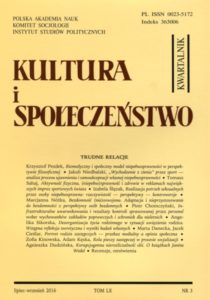BIOMEDYCZNY I SPOŁECZNY MODEL NIEPEŁNOSPRAWNOŚCI W PERSPEKTYWIE FILOZOFICZNEJ
THE BIOMEDICAL AND SOCIAL MODEL OF DISABILITY
IN THE PHILOSOPHICAL PERSPECTIVE
Author(s): Krzysztof PezdekSubject(s): Social Sciences, Social Philosophy, Health and medicine and law
Published by: Instytut Studiów Politycznych PAN
Keywords: biomedical model of disability; biomedyczny model niepełnosprawności; social model of disability; społeczny model niepełnosprawności; norma; norm; emancypacja; emancipation; władza; authority
Summary/Abstract: The author’s aim is to support the hypothesis that what is considered the norm (normal, normality) is of fundamental importance in shaping the biomedical and social model of disability. The content of that norm largely determines whether an individual in society will be classified as a person with or without a disability. All norms concerning health and functioning have their source in axiological considerations of set ideas about the human body and society. In this sense, the norms do not reflect the entire phenomenon of disability, which they standardize. At most they reflect how it is treated by social institutions (the authorities) in a given time and place and what consequences this has for the development of the individual with a disability (the problem of emancipation). The theoretical basis for these thoughts is the philosophical perspective proposed by Georges Canguilhem, Jürgen Habermas, and Michel Foucault.
Journal: Kultura i Społeczeństwo
- Issue Year: 60/2016
- Issue No: 3
- Page Range: 3-11
- Page Count: 9
- Language: Polish

